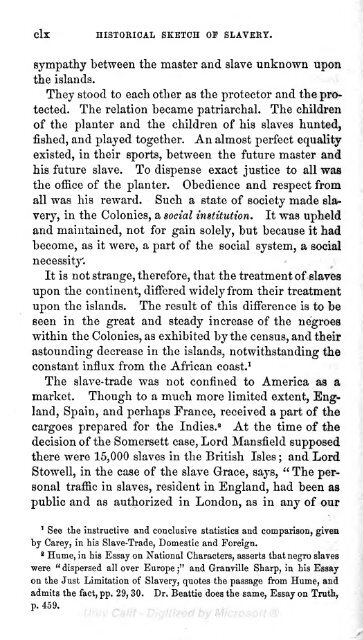Untitled - African American History
Untitled - African American History
Untitled - African American History
You also want an ePaper? Increase the reach of your titles
YUMPU automatically turns print PDFs into web optimized ePapers that Google loves.
Clx HISTORICAL SKETCH OF SLAVERY.<br />
sympathy between the master and slave unknown upon<br />
the islands.<br />
They stood to each other as the protector and the protected.<br />
The relation became patriarchal. The children<br />
of the planter and the children of his slaves hunted,<br />
fished, and played together. An almost perfect equality<br />
existed, in their sports, between the future master and<br />
his future slave. To dispense exact justice to all was<br />
the office of the planter. Obedience and respect from<br />
all was his reward. Such a state of society made sla-<br />
very, in the Colonies, a social institution. It was upheld<br />
and maintained, not for gain solely, but because it had<br />
become, as it were, a part of the social system, a social<br />
necessity.<br />
It is not strange, therefore, that the treatment of slaves<br />
from their treatment<br />
upon the continent, differed widely<br />
upon the islands. The result of this difference is to be<br />
seen in the great and steady increase of the negroes<br />
within the Colonies, as exhibited by the census, and their<br />
astounding decrease in the islands, notwithstanding the<br />
constant influx from the <strong>African</strong> coast. 1<br />
The slave-trade was not confined to America as a<br />
market. Though to a much more limited extent, England,<br />
Spain, and perhaps France, received a part of the<br />
cargoes prepared for the Indies. 2 At the time of the<br />
decision of the Somersett case, Lord Mansfield supposed<br />
there were 15,000 slaves in the British Isles ; and Lord<br />
Stowell, in the case of the slave Grace, says, " The personal<br />
traffic in slaves, resident in England, had been as<br />
public and as authorized in London, as in any of our<br />
1<br />
See the instructive and conclusive statistics and comparison, given<br />
by Carey, in his Slave-Trade, Domestic and Foreign.<br />
2 Hume, in his Essay on National Characters, asserts that negro slaves<br />
were " dispersed all over Europe ;" and Granville Sharp, in his Essay<br />
on the Just Limitation of Slavery, quotes the passage from Hume, and<br />
admits the fact, pp. 29, 30. Dr. Beattie does the same, Essay on Truth,<br />
p. 459.


